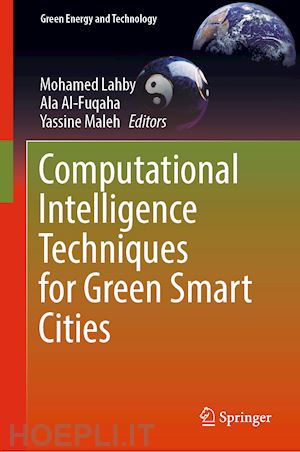
Questo prodotto usufruisce delle SPEDIZIONI GRATIS
selezionando l'opzione Corriere Veloce in fase di ordine.
Pagabile anche con Carta della cultura giovani e del merito, 18App Bonus Cultura e Carta del Docente
This book contains high-quality and original research on computational intelligence for green smart cities research. In recent years, the use of smart city technology has rapidly increased through the successful development and deployment of Internet of Things (IoT) architectures. The citizens' quality of life has been improved in several sensitive areas of the city, such as transportation, buildings, health care, education, environment, and security, thanks to these technological advances
Computational intelligence techniques and algorithms enable a computational analysis of enormous data sets to reveal patterns that recur. This information is used to inform and improve decision-making at the municipal level to build smart computational intelligence techniques and sustainable cities for their citizens. Machine intelligence allows us to identify trends (patterns). The smart city could better integrate its transportation network, for example. By offering a better public transportation network adapted to the demand, we could reduce personal vehicles and energy consumption. A smart city could use models to predict the consequences of a change, such as pedestrianizing a street or adding a bike lane. A city can even create a 3D digital twin to test hypothetical projects.
This book comprises many state-of-the-art contributions from scientists and practitioners working in machine intelligence and green smart cities. It aspires to provide a relevant reference for students, researchers, engineers, and professionals working in this area or those interested in grasping its diverse facets and exploring the latest advances in machine intelligence for green and sustainable smart city applications.
Mohamed Lahby is an Associate Professor at the Higher Normal School (ENS) University Hassan II of Casablanca, Morocco. His PhD in Computer Science from the Faculty of Sciences and Technology of Mohammedia, University Hassan II of Casablanca, in 2013. His research interests are wireless communication and network, mobility management, QoS/QoE, Internet of things, Smart cities, Optimization and Machine learning. He has published more than 35 papers (book chapters, international journals, and conferences), 3 edited books, and 2 authored books. He has served and continues to serve on executive and technical program committees of numerous international conferences such as IEEE PIMRC, ICC, NTMS, IWCMC, WINCOM, ISNCC. He also serves as a referee of many prestigious Elsevier journals : Ad Hoc Networks, Applied Computing and Informatics and International journal of disaster risk reduction. He organized and participated in more than 40 conferences and workshops. He is the chair of manyinternational workshops and special sessions such as MLNGSN’19, CSPSC’19, MLNGSN’20, AI2SC ’20, WCTCP’20, CIOT’2022.
Ala Al-Fuqaha is a professor at the Computer Science department, Hamad Bin Khalifa University, Qatar. His research interests include the use of machine learning in general and deep learning in particular in support of the data-driven and self-driven management of large-scale deployments of Internet of Things and smart city infrastructure and services, Wireless Vehicular Networks, cooperation and spectrum access etiquette in cognitive radio networks, and management and planning of software defined networks. He is a senior member of the IEEE and an ABET commissioner. He serves on editorial boards of multiple journals including IEEE Communications Letter, IEEE Network Magazine, and Springer AJSE. He also served as chair, co-chair, and technical program committee member of multiple international conferences including IEEE VTC, IEEE Globecom, IEEE ICC, and IWCMC.
Yassine Maleh is an Associate Professor at the National School of Applied Sciences at Sultan Moulay Slimane University, Morocco. He received his PhD degree in Computer Science from Hassan 1st University, Morocco. He is a cybersecurity and Information Technology researcher and practitioner with industry and academic experience. He worked for the National Ports Agency in Morocco as an IT manager from 2012 to 2019. He is a Senior Member of IEEE, Member of the International Association of Engineers IAENG and The Machine Intelligence Research Labs. Dr Maleh has made contributions in the fields of information security and privacy, Internet of Things Security, Wireless and Constrained Networks Security. His research interests include Information Security and Privacy, Internet of Things, Networks Security, Information system and IT Governance. He has published over than 50 papers (Book chapters, international journals and conferences/workshops), 7 edited books and 3 authoredbooks. He is the editor in chief of the International Journal of Smart Security Technologies (IJSST). He serves as an Associate Editor for IEEE Access (2019 Impact Factor 4.098), the International Journal of Digital Crime and Forensics (IJDCF) and the International Journal of Information Security and Privacy (IJISP). He was also a Guest Editor of a special issue on Recent Advances on Cyber Security and Privacy for Cloud-of-Things of the International Journal of Digital Crime and Forensics (IJDCF), Volume 10, Issue 3, July-September 2019. He has served and continues to serve on executive and technical program committees and as a reviewer of numerous international conference and journals such as Elsevier Ad Hoc Networks, IEEE Network Magazine, IEEE Sensor Journal, ICT Express, and Springer Cluster Computing. He was the Publicity chair of BCCA 2019 and the General Chair of the MLBDACP 19 symposium. and Data Management.











Il sito utilizza cookie ed altri strumenti di tracciamento che raccolgono informazioni dal dispositivo dell’utente. Oltre ai cookie tecnici ed analitici aggregati, strettamente necessari per il funzionamento di questo sito web, previo consenso dell’utente possono essere installati cookie di profilazione e marketing e cookie dei social media. Cliccando su “Accetto tutti i cookie” saranno attivate tutte le categorie di cookie. Per accettare solo deterninate categorie di cookie, cliccare invece su “Impostazioni cookie”. Chiudendo il banner o continuando a navigare saranno installati solo cookie tecnici. Per maggiori dettagli, consultare la Cookie Policy.